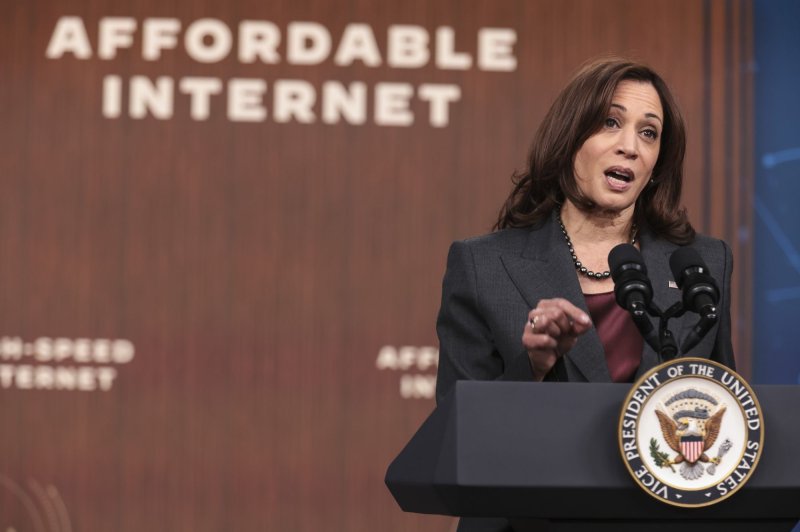1 of 4 | Vice President Kamala Harris speaks during an event and announced that more than 10 million American households have enrolled in the Affordable Connectivity Program, at the Eisenhower Executive Office Building in Washington, D.C., on February 14. File Photo by Oliver Contreras/UPI |
License Photo
March 21 (UPI) -- Vice President Kamala Harris on Monday touted Biden administration efforts to provide high-speed broadband Internet to rural and low-income American communities during a trip to Louisiana.
Harris toured a community library in Sunset, La., a small town about 65 miles west of Baton Rouge, and meet with residents of St. Landry Parish to discuss the importance of high-speed Internet.
She was joined by Louisiana Gov. John Bel Edwards, Deputy Secretary of Commerce Don Graves, senior White House adviser Cedric Richmond and Rep. Troy Carter, D-La.
At the event, Harris was introduced by local student Josie Lemelle, who told of how some students in her area who lacked high-speed connections couldn't effectively participate in virtual learning necessitated by the COVID-19 pandemic.
"The execution of virtual learning in our parish was very difficult due to many students living in rural areas," she said, adding they were "repeatedly kicked out our virtual platform, Google Meet, when our Internet connection failed."
This caused the process of virtual learning to be "10 times more difficult," Lemelle said.
Harris agreed and related stories of students forced to use public WiFi hot spots in restaurant parking lots to participate in virtual classes during the pandemic.
"In the 21st century, high-speed Internet is a necessity -- full-stop. It is a necessity," she said.
St. Landry Parish "is a community that is all too familiar with these challenges, though this is a community that is filled with extraordinary leaders," she said, noting that 34% of its residents are without high-speed Internet.
The $14.2 billion Affordable Connectivity Program, created as part of the bipartisan infrastructure bill signed into law last year by President Joe Biden, is providing $29 million to connect 22,000 parish residents and 3,000 businesses to fiber-optic Internet. Harris said.
Biden administration members also touted the achievements of the program at a White House event last month. The vice president said that more than 10 million U.S. homes have enrolled so far in the program to make broadband Internet access affordable for low-income Americans.
It provides monthly broadband Internet discounts of up to $30 for households that are at or below 200% of federal poverty guidelines. It also provides low-income homes a one-time $100 discount to buy a computer or tablet and says households on tribal lands can receive monthly discounts up to $75.
![]()
President Joe Biden signs the $1.2 trillion bipartisan infrastructure bill into law on the South Lawn of the White House in Washington, D.C., on November 15, 2021. The $14.2 billion Affordable Connectivity Program was created as part of the bill. File Photo by Sarah Silbiger/UPI
Earlier this month, Biden praised his administration's efforts in providing high-speed Internet during a speech to the National League of Cities Congressional City Conference in Washington, D.C.
"We can't be a country where a mother has to take her kid to a McDonald's parking lot to do their homework on the internet," Biden said then. "This is the United States of America, for God's sake."
The vice president's trip to Louisiana was originally supposed to happen last month, but was postponed after Russia invaded Ukraine. She was then supposed to visit last Friday, but again delayed the trip. The White House didn't give a reason for the second delay, but it could be related to her husband, Doug Emhoff, testing positive for COVID-19 last week.
















